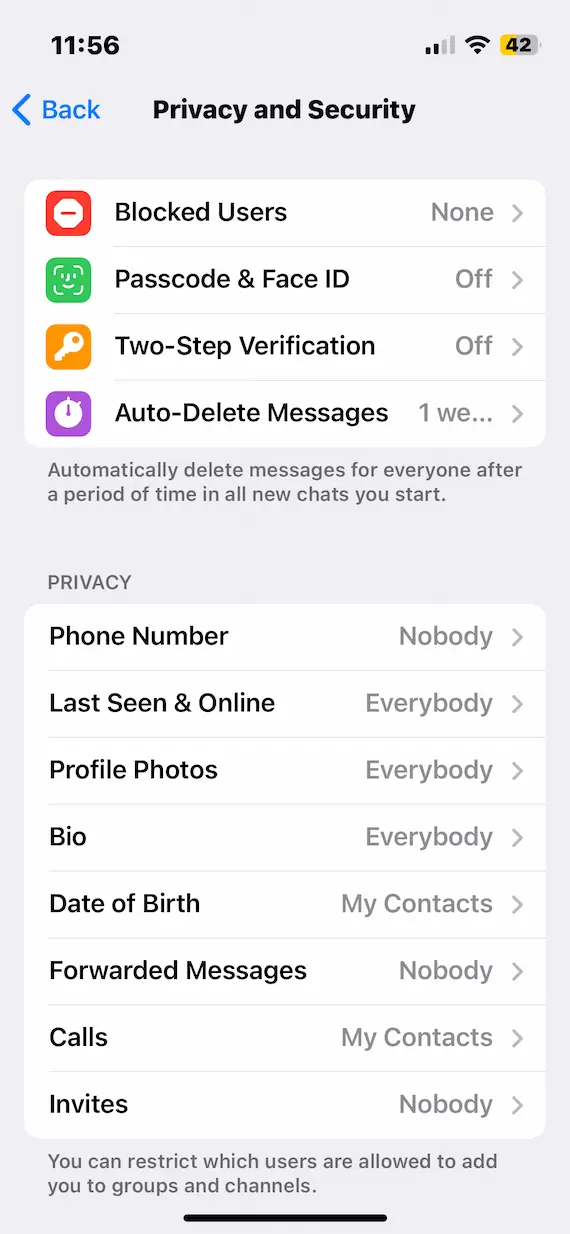If you watch the news on a regular basis, you may have noticed that some government officials like to give statements through an encrypted chat app called Telegram. Many people, in and outside of government, use Telegram. But, like flies to honey, scammers are also attracted to the platform. Consequently, Telegram scams are all too common.
What is a Telegram scam?
The term “Telegram scam” isn’t about a particular method of scamming people. Rather, it’s about using the Telegram messaging app as an avenue of attack. This makes Telegram scams similar to WhatsApp scams or other text message-based scams. Hackers typically adapt their methods to fit the platform and its main demographic.
For example, Telegram is more popular with younger users; people aged 25–34 make up around 30% of the platform’s users. But while this demographic tends to be more tech-literate and aware of obvious online scams, they often fall victim to situation-specific scams like fake job ads and job recruiters.
Not to mention that Telegram is most known for its security and anonymity (whether this is an accurate description of the app or not). This gives users a false sense of safety when using it. That’s because criminals aren’t targeting Telegram as a platform; they’re targeting its users. They engineer their scams to take advantage of user-specific weaknesses, exploiting them to extort money, personal information, or access to various accounts.
Can you be scammed on Telegram?
You can definitely be scammed on Telegram, just as you can on any other communication platform, whether online or offline. However, with some education and caution, users can identify Telegram scams and avoid becoming victims.
Telegram claims to be encrypted, but it was discovered roughly a decade ago by security researchers that Telegram was not using end-to-end encryption as its default option. This feature, along with other privacy features, is disabled by default. And not every user will go to the length to learn where these features are and how to enable them. Most users just assume Telegram has already taken care of it for them.
All of this is to say that Telegram’s security protocols are severely lacking compared to those of competitors such as Signal. Therefore, your private information can be intercepted by scammers on Telegram.
Block apps that send your data to Russia
How do people get scammed on Telegram?
Scammers like to stick with what works. If a particular scam is highly effective, why reinvent the wheel? Consequently, Telegram app scams can be categorized into the following:
- Social engineering: An attacker pretends to be a trusted person or organization, such as a customer service representative for a major company. Or they may act as a relative or close friend in trouble who requires money urgently due to a rapidly deteriorating situation.
- Phishing: Getting users to click on malware-infected links is the oldest online scam in the book. Once you have clicked that link, entered personal details, or downloaded an infected file, the hook is set.
- Get-rich-quick schemes: Everybody likes something for nothing, especially money. It’s no surprise that scams on Telegram that offer a quick payday manage to snare a lot of people.
- Threats: Sometimes, criminals drop the pretense and flat-out blackmail you. They may threaten to leak fake information about you unless you pay them.

Why do criminals use Telegram for scams?
You may ask yourself why criminals naturally gravitate to places like Telegram in the first place. What is it about Telegram that scammers like so much?
It could have something to do with the following:
- A large selection of victims: Criminals go where their potential victims are. The larger the pool of targets, the more scammers are going to congregate there.
- Telegram public groups are searchable: When was the last time you saw a search engine in a chat program? Telegram has one, which means scammers can search public groups for the right people to target.
- No active phone number is required: Although Telegram accounts are registered via phone numbers, the app actually doesn’t need that number after the account has been set up. This means that Telegram scammers can get a burner number (paid for with cryptocurrency, for example), set up an account, and get the one-time verification code sent to the number. The burner number can then be disposed of and is never needed again.
- Self-destructing messages will destroy evidence: Telegram’s self-destruct feature sets a timer on messages, which will be deleted when the timer runs out. This makes it easy for criminals to destroy incriminating evidence.
Common Telegram app scams to be aware of
Earlier, we categorized the common scams on Telegram. Now, it’s time to delve into some detail.
1. Telegram job scams
It’s natural to want to be wealthy, but some people like to circumvent the concept of “hard work” in their quest to earn cash. So when scammers offer false rewards like high-paying jobs that appear to require little actual work, unsuspecting victims often jump right on them. Only yesterday, I received a job offer from a “head hunter” offering me $60 per hour to answer survey questions.
Why do scammers do this? They usually ask for personal information, which they can then steal. For example, they may send a fake contract for you to sign, giving them your signature. They’ll claim to need your bank details so they can pay you. And, just for good measure, they may even ask you to pay a fee.
2. Friends turn into fraudsters
Having your friends list publicly available on social media could be your Achilles heel. These lists tell scammers who your friends are so they know who to impersonate to pull a fast one on you.
If you get a “friend” contacting you on Telegram asking you for money, it’s possible that an attacker is posing as that person in order to scam you. If you do have friends on Telegram who like to hit you up for money, verify their identity by contacting them on an alternative platform.
3. Telegram dating scams
Telegram romance scams are extremely common. Someone will contact you and start flirting. Maybe it’s a widow or widower? A stunning model? A rich businessperson?
When flirting turns to more serious conversations, the person may eventually profess their undying love for you. Soon afterward, the requests for money will start coming. They need plane tickets to meet you or money for miscellaneous expenses. Many people, unfortunately, become victims of this type of Telegram scam because criminals are preying on human nature and the desire to be loved.
4. Telegram crypto scams
Crypto scams are as old as the technology itself, building off of “insider information” investment scams that urge users to buy and sell stock en masse with the promise of great returns. And with the renewed interest in cryptocurrencies, crypto scams on Telegram alone have surged an estimated 2,000% since November of 2024.
As a part of these scams, users are added to or lured into joining “secret crypto investment” group chats on the Telegram app. There, they are urged to use a particular trading platform to create their cryptocurrency wallet, fully controlled by the malicious individual.
With this type of scam, there’s usually no further phishing or malicious malware. Instead, victims are urged to invest more money into what looks like a real cryptocurrency wallet, but they’re actually transferring funds to the malicious actor, with any growth on the platform being fake.
5. Tech support scam
If you get a message from someone claiming to be from Telegram tech support informing you that there is a problem with your Telegram account, don’t fall for it.
Genuine Telegram support representatives will never contact you with unsolicited messages. It’s likely a fraudster on the other end of the chat, ready and waiting to receive your account details so they can steal them. They’ll get you worked up into a frenzy, thinking that urgent action is required.
6. Telegram sugar daddy fraud
The concept of the “sugar daddy,” a rich man seeking to spend his money spoiling deserving ladies, can be easily manipulated on a platform like Telegram. Scammers will utilize Telegram to set up a profile that no woman can resist.
If you fall victim to one of these fake profiles, the requests for money will soon start coming in. But wait, isn’t a sugar daddy supposed to give money to you? You might think it would be obvious that this isn’t how the process is supposed to work. Nevertheless, people do fall prey to these tricks and end up losing large sums of money as a result.
7. Telegram code scams
The aim of this particular deception is to steal your phone number and use it on a new Telegram account in order to impersonate you. The scammer sets up an account under your phone number (which they can find by looking online if you put it on social media, for example.) Then, when the verification code comes to your phone, they get in touch and trick you into handing it over.
If you receive any unsolicited activation codes, ignore them. And if someone contacts you asking for that code, definitely ignore them.
8. Fake apps and malware threats
When installing a new app on your iPhone or MacBook, it’s crucial that you only use verified means — ideally, the App Store. Fake apps can often pose as real ones, using similar or near-identical logos and names to trick users into downloading them and enabling access permissions to files, calls, and messages.
In 2023, a fake Telegram app was downloaded by over 10 million users, infecting their devices with spyware and malware. Working in the background, the fake Telegram app was able to collect personal information, such as full names, user IDs, contact lists, and even private messages. Even if the stolen data doesn’t include financial information, all that personal information could be used to facilitate more accurate social engineering attacks in the future.
9. AI phishing, voice cloning, and deepfake impersonation
AI is shaping up to be the new frontier of Telegram scams. With the technology more accessible and affordable than ever, malicious actors are making use of voice cloning and deepfake impersonation to trick users into clicking links or sending money. Recently, the founder of THORChain lost over $1 million after falling for a deepfake scam on Zoom and Telegram and circulating a malicious meeting link in the company’s internal chat.
But this doesn’t just apply to corporations and businesses. It’s now possible to fake a phone call to trick a user’s family member into sending money or sharing personal and financial information. Older family members are particularly vulnerable to such scams. It’s reported that older adults lost a total of $3.4 billion to scams in 2023 alone.
10. Celebrity impersonators on Telegram
Is that really Britney Spears messaging you on Telegram? And look! Another message is coming in from Elon Musk! This must be your lucky day! Sorry to burst your bubble, but that isn’t Britney or Elon. It’s more likely a scammer.
Scammers posing as celebrities on Telegram may send you messages asking for donations to their favorite charity, money for a business venture that is going to make billions of dollars, or a few bucks to help with a sudden chaotic personal situation that must be resolved right this very minute. If Jeff Bezos contacts you because he needs help with his heating bill, think twice.
11. Giveaway scams
Unsolicited Telegram messages that congratulate you on winning the lottery or invite you to sign up for an upcoming giveaway are sure scams. While they might seem harmless on the surface — after all, you’re just sharing your email and phone number — these unsolicited messages can lead to severe consequences.Sometimes, just clicking on the link to sign up for the giveaway can trigger an automatic download of a virus or malware. In other cases, the scammers request a “small fee” to ship your prize or to process the reward money. In the best-case scenario, they steal the small fee. In the worst case, your payment information has been compromised.
12. Deceptive Telegram bot schemes
Telegram bots aren’t all bad. A lot of them function as tools that help with productivity or manage customer service for small businesses. Scammers are taking advantage of user trust in these bots to conduct their own scams, often utilizing legitimate-looking bots with fake verification checkmarks.
Telegram bot scams are able to collect any and all information you give them, communicating it to outside databases. For example, by impersonating the chatbot of a bank, they can trick users into giving away their financial information or account details. In other instances, they can urge users to click on malicious links or download files infected with malware.
13. Mimicked Telegram groups or channels
Another type of scam to watch out for is fake Telegram group chats. Individuals can set up their own private Telegram groups or channels, pretending to be legitimate business entities or trusted individuals. Generally, all they need to do is copy the logo and name of the original group. Many go as far as to acquire virtual phone numbers that closely resemble the original.
Once the chat is made to look real, the attacker proceeds with social engineering attacks, earning the trust of users through professional-sounding dialogue. As such, it’s important when using Telegram to ensure that you’re talking to the right person and to be wary of anyone asking for personal or financial information over chat.
What to do if you’ve been scammed on Telegram
So, you had a momentary lapse of judgment. You let your guard down for a moment, and a scammer took full advantage. What now? Here are some proactive measures you can take.
Inform your bank if your account is compromised
If you have given the criminal your bank details, get in touch with the bank right away and report it. The bank will lock down your account, cancel any bank cards or credit cards, and stop any money going out.
Obviously, this means you can’t take any money out, either, until the whole thing has been sorted out. But it’s better than your entire account being emptied and sent to a “Nigerian Prince.”
This same advice applies to any other account the scammer may now have access to. Lock it down.
Scan your device for malware
If you clicked on a link that was obviously malware, you need to scan your device, find it, and remove it before it wreaks havoc.
There are many anti-malware apps to choose from, and many of the big names, such as Avast, AVG, and Malwarebytes, have mobile app versions too. They also either have free versions or free trials. Pick one and start scanning.
If the app finds a virus and claims it has been removed, you can also go with the nuclear option and completely wipe and factory reset your device. That way, you will know for sure that any malware is gone.
How to report scams on the Telegram app


The other urgent thing you need to do is ensure that the cyber-fiends are no longer able to claim more victims. This means reporting them to Telegram and getting them shut down. Here’s how to do it:
- Search for the @notoscam bot on Telegram. The image above shows the official account (with the blue tick) in the search results, along with what appear to be 2 fake accounts. Choose the one with the blue tick.
- When the chat window opens, enter the details of the scam account. The bot may not reply immediately, but Telegram insists that this is the correct way to report a scam.
Is Telegram safe to use?
Telegram is generally considered to be safe and secure to use. Or, at least, it is as safe as any other online chat platform. As long as you use caution and good judgment, you should be fine.
Saying that, there are some things you should bear in mind if you would like to make Telegram safer to use:
- Chats are not encrypted by default: Telegram chats do not use end-to-end encryption by default, making your messages vulnerable unless you turn on this option.
- Telegram keeps your data: Instead of not collecting user information, Telegram hoards it on servers. That means there is a risk of a colossal data breach affecting you.
While Telegram is popular, it isn’t immune to hacking or scams, and it’s crucial to be cautious about security flaws. Similarly, other messaging apps like Facebook Messenger have faced security breaches, leading to significant concerns.
How to avoid scams on Telegram
There are some basic actions you can take to stay safe on Telegram and avoid scams on the app that ensnare people.
Be extremely wary of any chats from unknown senders
If a complete stranger gets in touch, be polite but wary. How did they get your contact details? Be reserved. And if they ask for personal information, stop the conversation immediately.
Even if it looks like a friend contacting you, verify their identity by asking them something only they would know.
Never click on links
Some links may be legitimate, but how can you know for sure? The best policy is to never click on a link in a Telegram message.
Use Secret Chats


Telegram has a feature called Secret Chats, which puts an extra layer of protection on your conversations. To enable the feature (which must be done each time you start a new chat), click their name at the top, hit the 3-dot button, and select Start Secret Chat.
Now, you have end-to-end encryption, as well as self-destructing messages. These features are so secure that it begs the question why they aren’t enabled by default.
Enable two-factor authentication


Enabling 2-factor authentication stops anyone from logging into Telegram using your phone number. As long as you don’t share the 2FA codes, no one else can use an account with your number.
Just don’t hand over any codes if someone contacts you asking for them.
The risks outlined above may lead you to incorrectly assume that Telegram is a treacherous place full of evil people ready to rob you and lie to you. However, it is possible to stay safe and have a positive Telegram experience. Just be wary, think twice before revealing anything to anyone — and don’t click on any links!
This is an independent publication, and it has not been authorized, sponsored, or otherwise approved by Telegram Messenger Inc. Telegram is a trademark of Telegram Messenger Inc.







